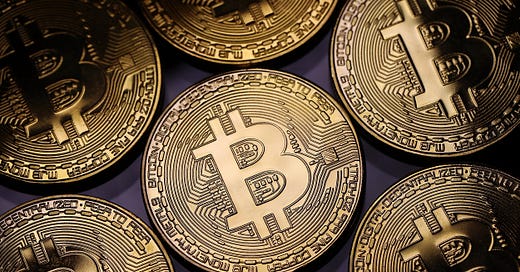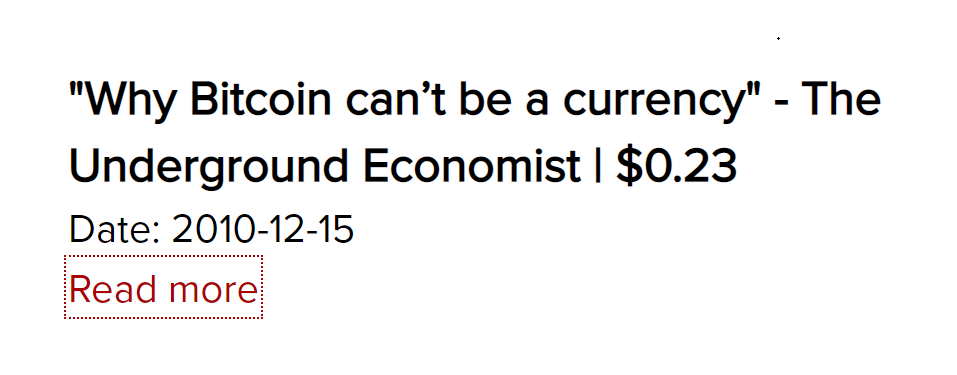A generational opportunity (but it's not what you think.)
After elaborating on the deeply entrenched concepts of Gell-Mann amnesia and Russell conjugation as a part of our legacy media's mostly regrettable customs, I believe the time has come to dissect the most common misconceptions in their reporting on one of their seemingly least favorite topics. Cryptocurrency. My aspiration is to do this concisely, but with sufficient granularity nonetheless.
It should be noted that legacy media's journalists have generally reported negatively about Bitcoin since its inception. On the website 99bitcoins.com, 442 Bitcoin obituaries can be found! 442 times that the media has declared Bitcoin dead. The first article stating Bitcoin will be worthless sooner rather than later was posted at the price of 0,23$, in 2010.
Truly remarkable, seeing as in the decade that followed, a flourishing ecosystem worth multiple trillions of dollars was built, from scratch, without any institutional help, and despite various active obstructions from most governments. The industry has become quite sizeable. It succeeded in attracting many venture capitalists, in turn causing a brain-drain not seen since the dotcom era, in an already increasingly competitive ‘war for talent’ human resources landscape. On top of that, the world's most sophisticated investors, hedge-funds and richest people have sought financial exposure to this asset class, either because they think growth and adoption will continue, or, perhaps even more interestingly, simply out of caution against only having exposure to traditional fiat currencies. And all of this happened while central banks are scrambling to roll out their own blockchain based currencies as fast as is feasible.
The disparity between the 442 obituaries and reality is so large that it becomes difficult to explain without moving goal posts on what the word disingenuous means. We’re not just talking about differences of opinion here, but about profound misunderstandings and easy to rebut straw man arguments that, at the end of the day, are best understood as a strategy by incumbent elites to undermine a potentially revolutionary new form of money that they don't control.
So let's get cracking, shall we?
Misconception nr.1: Cryptocurrencies are destroying the environment.
The buzzwords du jour, it seems. Usually, the basic math accompanying statements of this kind is based on a back-of-the-napkin 'energy per transaction' calculation that is extrapolated to a borderline nonsensical conclusion. Example below.
But here's the thing: there is no per-transaction energy cost in Bitcoin. Energy is used to secure the whole network. Additional transactions don't increase the energy required, just like more banking transactions wouldn't increase the electricity bill of a bank.
Another regular occurrence is the use of numbers without context such as 'Bitcoin uses more energy than whole countries!'. And this is true, it is currently ranked nr.23 in the world in energy use, between Thailand and Vietnam. But at approximately 1 trillion dollars, it also has a much larger GDP than the countries it is compared to. Moreover, there are multiple industries that use more energy than entire countries.
The critics using this narrative also turn a blind eye to the greater energy expenditures of the traditional banking system. The various natural resources needed to produce paper currency, and much more importantly the colossal costs of hundreds of thousands of servers, branches, ATM's and all that is required to support them, to name a few things. It becomes apparent that a comprehensively holistic evaluation of traditional banking's energy costs reveals that Bitcoin may in fact consume a fraction of the energy. So what if increased adoption of crypto as currency could potentially materially reduce the current energy consumption levels of our vast monetary systems worldwide? I, for one, have never read any reporting of this kind, let alone of the kind that would declare the traditional banking system dead over 400 times.
Renewable Energy
Iceland is using geothermal energy that would ordinarily not be efficiently allocated by putting it to use for Bitcoin mining, thereby converting energy that would normally be wasted into a potential global currency. El Salvador is using volcanic energy to pursue similar goals. Texas is finding ways to capture wasted natural gas to mine Bitcoin instead of flaring it. There are many other examples of this, and this trend is just beginning. The energy use of illicit coal extraction in China has caused miners to relocate. What if the mere existence of the Bitcoin mining system incentivises energy not to be wasted as it can be converted in to cryptocurrency, and pushes participants to find the most sustainable and renewable ways to pursue their goals, stirring industrial and technological growth in countries all over the world?
Oh, and it’s worth noting that the scandalously gargantuan U.S. military, whose presence worldwide is necessary to backstop the international dollar system, is the largest single consumer of oil worldwide. Maybe that will rustle some feathers..
Aside from the dubious use of statistics to support the faux-environmental narrative and the lack of reporting on the potential of the growing role of renewable energy in what is effectively still just a nascent industry, the undertone in most articles seems to be that energy is not simply ‘used’, but 'wasted', implying that the world would be better of without a decentralized global currency altogether.
This underlying premise is important not to overlook and must be seen for what it is. The vast majority of the time, the environmental narrative is simply used as a metonymy for saying 'we don't believe crypto should exist', to attempt to protect the deeply-rooted, global reliance on highly centralized and non-inclusive fiat currency, and bolster conviction in the dollar amid inflationary pressures following a substantial infusion of aid money.
It should not be denied that Bitcoin uses energy and that its potential climate externalities need to be monitored. But mining can be guided towards a green future, not just for Bitcoin, but by creating new habits for how we solve energy waste in general. A generational opportunity that should be fully embraced, or at the very least thoroughly researched, in stead of being outright swept under the rug by the same people who were wrong for 12 years, and counting.
My next post will dissect the perhaps even crazier misconception that crypto is anonymous, untraceable and mainly used for illicit activities.






